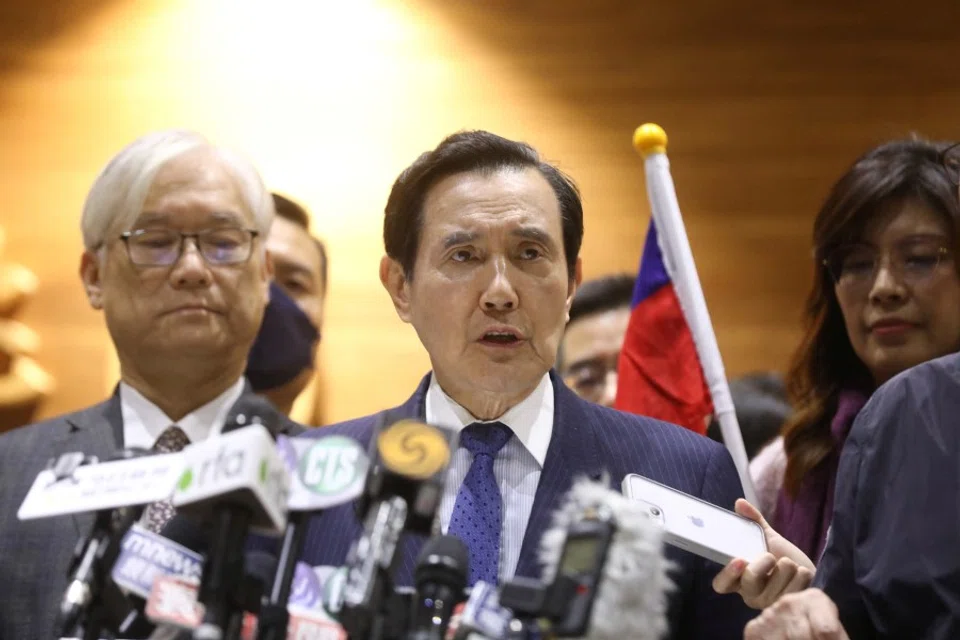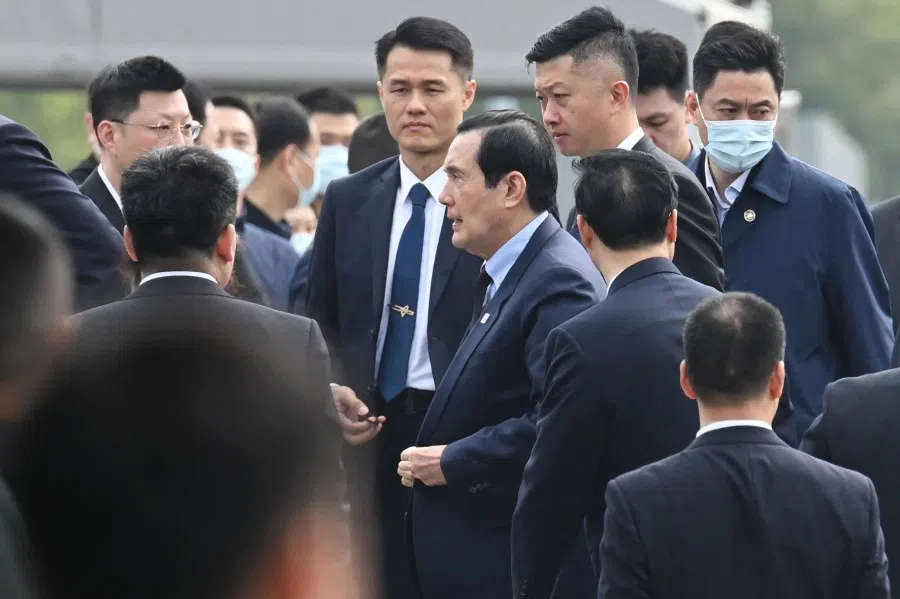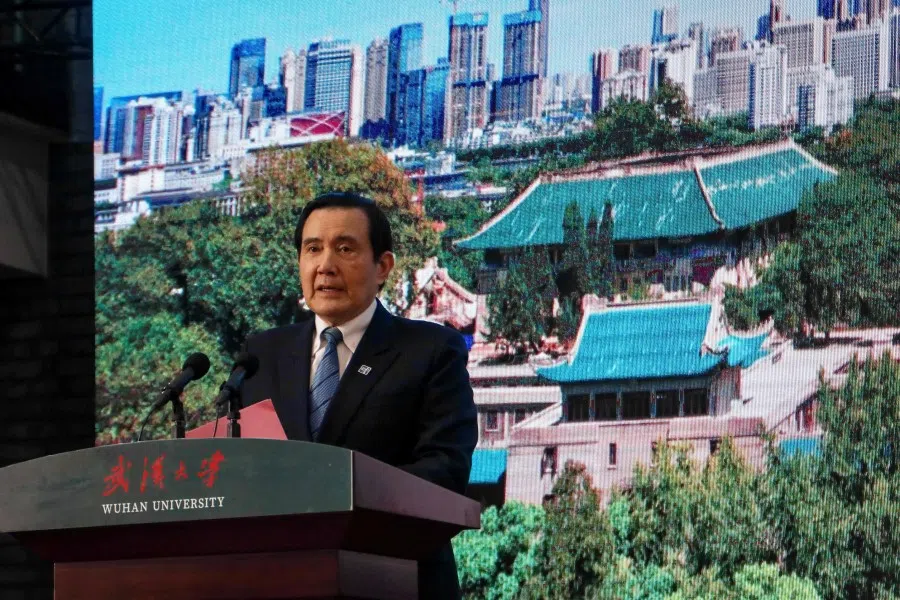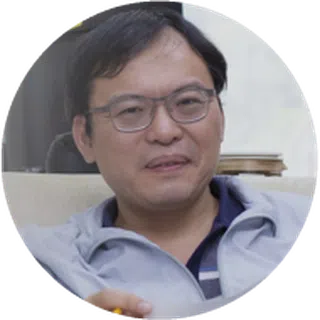CCP achieved its objectives with Ma Ying-jeou's visit
Taiwanese research fellow Tsai Wen-Hsuan sees the recent visit to China by former Taiwan President Ma Ying-jeou and the courtesies extended to him as a calculated move by Beijing. In the CCP's estimation, Ma's positions are helpful to China's narrative of peaceful reunification, and the visit may also quieten some discontent about the party's cross-strait policy.

Ma Ying-jeou, the former president of the Republic of China (ROC), visited China from 27 March to 7 April. His trip garnered much attention. For the Beijing authorities, there were several underlying reasons behind the Chinese Communist Party (CCP)'s reception of Ma and its handling of his visit arrangements.
One objective was to gain the support of the Taiwanese people in order to help the Kuomintang (KMT, Nationalist Party) win the 2024 presidential election. The second objective was to declare to the international community the importance of the "one China" principle and the "1992 Consensus". Finally, the visit is part of the CCP's continuing efforts to show the Chinese people that it advocates peaceful reunification, even as it seeks to dispel dissatisfaction towards the CCP's hawkish cross-strait policy.
A carefully considered visit
The primary objective of the CCP's reception of Ma Ying-jeou was to gain the support of the Taiwanese people and boost the Kuomintang's chances of winning the 2024 presidential election. Although Ma Ying-jeou's visit to China was ostensibly for ancestral worship and included a visit to the Nanjing Massacre Memorial Hall, the process of arranging the itinerary and meeting Chinese officials was, of course, fraught with political considerations.
When Ma Ying-jeou's plane landed at Shanghai Pudong Airport on 27 March, only Chen Yuanfeng, deputy director of the Taiwan Affairs Office of the State Council, greeted the plane and not Vice-Premier of the State Council Ding Xuexiang as had been rumoured. There are several possible explanations for this.

Firstly, the media may have been spreading misinformation. In actuality, the CCP did not arrange for Ding Xuexiang to receive him, as Ma Ying-jeou is not the current head of state and is instead viewed as the former Kuomintang chairman. In addition, when Lien Chan visited China in 2005, although he was met by Chen Yunlin, the director of the Taiwan Affairs Office of the State Council, Lien Chan was visiting China in his capacity as chairman of the Kuomintang. Therefore, Chen Yunlin was responsible for welcoming him. If so, reports of the CCP intending to humiliate Ma Ying-jeou or ignore his visit are unfair.
...the CCP may have intended to allow Ma to meet with the future Chinese leadership group in order to build mutual trust for future cross-strait negotiations.
Meeting new-generation leaders and speaking of 'the ROC'
Second, during Ma Ying-jeou's visit to China, the secretaries of the local provincial party committees personally greeted him. For example, Ma met with the following officials: Xin Changxing, secretary of the Jiangsu Provincial Party Committee, on 28 March; Wang Menghui, secretary of the Hubei Provincial Party Committee, on 29 March; Shen Xiaoming, secretary of the Hunan Provincial Party Committee, on 1 April; and Yuan Jiajun, secretary of the Chongqing Municipal Party Committee and a Politburo member, on 3 April. Finally, Ma met with Shanghai party secretary Chen Jining on 5 April.
In particular, Yuan Jiajun and Chen Jining are already deputy state-level leaders, so Ma's visit to China had a certain degree of courtesy in terms of reception specifications. In the future, these provincial party secretaries may be candidates for central leadership positions. In other words, the CCP may have intended to allow Ma to meet with the future Chinese leadership group in order to build mutual trust for future cross-strait negotiations.
The CCP even tacitly permitted Ma Ying-jeou to mention the existence of the ROC in his speech in China, in which he had already addressed the sensitive topic of "two Chinas". In his speech in Nanjing, Ma Ying-jeou referred to himself as the "former president of the ROC" and mentioned "Sun Yat-sen, the founding father of the ROC", among other phrases.
By manipulating Ma's visit to China, Beijing hopes to lessen Taiwan's hostility toward the CCP and increase support for the pan-Blue camp.
The CCP removed the pertinent information from the domestic reports in the mainland, but Ma Ying-jeou's formal public recognition of the ROC in China won the support of the pan-Blue population in Taiwan. This may assist the KMT in winning the 2024 presidential election.
During Ma Ying-jeou's China visit, the CCP actively downplayed the political aspects of his itinerary and made this trip about ancestral worship and commemorating the Anti-Japanese War victory as much as possible. By manipulating Ma's visit to China, Beijing hopes to lessen Taiwan's hostility toward the CCP and increase support for the pan-Blue camp.

For the CCP, the second purpose of Ma's visit was to communicate to the rest of the world the necessity of the "one China" policy and the "1992 Consensus". Although the CCP consented to Ma Ying-jeou's reference to the ROC, it imposed restrictions and precautions almost everywhere else.
The CCP referred to Ma Ying-jeou as Mr Ma, and when Ma mentioned "Mr Xi", mainland China emphasised the hope that the two sides of the strait could exist in harmony. Jiangsu provincial party secretary Xin Changxing stated that Ma Ying-jeou was the "former leader of the Taiwan region" who adheres to the "1992 Consensus" and the "one China" principle, and opposes Taiwan independence, so "we deeply appreciate this".
The contradictions and conflicts of the "two Chinas" will never be fully resolved in the future unless the CCP is willing to resolve this dispute through peaceful negotiations between the two sides.
This indicates that when the CCP conducts political consultations with Taiwan, the political framework is always a difficult obstacle to overcome. The contradictions and conflicts of the "two Chinas" will never be fully resolved in the future unless the CCP is willing to resolve this dispute through peaceful negotiations between the two sides.
The military option hovering in the background
Finally, the CCP hopes that Ma Ying-jeou's visit to China will ease concerns over the CCP's cross-strait policy from the "army of unity" in China. After more than 40 years of exchanges and contacts between the two sides of the strait, Taiwan's support for independence has increased, much to the chagrin of nationalists and war hawks in China.
Regarding political identity, Ma Ying-jeou supports the "one China" policy and opposes Taiwan's independence. The Chinese people also welcomed Ma's visit. This appears to be an encouraging sign for Xi Jinping's active pursuit of cross-strait reunification via negotiations.
However, the CCP's understanding of peace talks is underlined by military reunification, that is, "to force peace through war". In other words, despite Ma Ying-jeou's visit to China, Chinese diplomatic suppression and military intimidation of Taiwan will continue unabated.
Ma Ying-jeou's visit to China seems to have found a peaceful path for cross-strait relations. In reality, however, China, Taiwan, and the US each have their own projections regarding developments across the Taiwan Strait.
For China, the short-term motivation is to aid the KMT in regaining power in 2024. Meanwhile, the long-term objectives include accelerating China's political negotiations and consultations with Taiwan as much as possible to achieve the goal of peaceful reunification.
Related: All the subtleties: Former Taiwan President Ma Ying-jeou's words and actions in China | How Ma Ying-jeou tested Beijing's flexibility towards Taiwan | Chasing Ma Ying-jeou with the Chinese in Nanjing | Political significance of former Taiwan President Ma Ying-jeou's China visit | Will former Taiwan President Ma Ying-jeou's China visit win support for the KMT?





